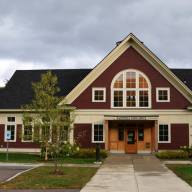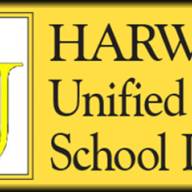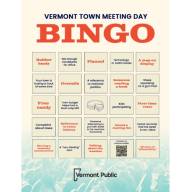Photo: Matt Henchen (L) and Jonah Ibson, (R)
Two Harwood Union High School educators are taking a bold step to deepen student learning and engagement, and they want the community to join them at the table. Teachers Matt Henchen and Jonah Ibson have been selected as Rowland Fellows by the Rowland Foundation, one of Vermont’s most prestigious fellowships for secondary school educators. The fellowship provides a grant of up to $150,000 to support innovative projects that positively impact the climate and culture of schools in Vermont.
Henchen and Ibson’s project is centered on deliberative dialogue, a practice that emphasizes listening, reflection, and meaningful participation in decision-making. “We want to create spaces where students, teachers, families, and community members can be heard,” said Henchen. “It’s about sharing power with the community, connecting learning to purpose, and building understanding about the complex realities of education today.”
To guide this work, Henchen and Ibson have established a Collaborative Work Group (CWG) that meets weekly and brings together a diverse range of voices from across the school community. Members include students junior Dahlia Jordan and senior Sawyer Popowicz; teachers Becky Allen (math), Peter Arsenault (physical education), Susannah Cowden (science), Brian Boyes (music and former Rowland Fellow), Sarah Popowicz (Connected Learning), Lynda Cummings (special education), and Erin Dezell (guidance); as well as Harwood principal Megan McDonough. Together, this group will provide insight, guidance, and feedback, ensuring that the project is inclusive, responsive, and rooted in the needs and aspirations of the broader school community, Henchen said.
Strengthening Community Connections is a central goal of the project. Ibson explained, “We want to hear from the community, provide a chance to share our perspective, and use deliberative practices to uncover common ground and identify concrete ways to improve the quality of our public schools.” “This is about fostering better, more resilient, and more sustainable communities,” Henchen noted. Deliberative dialogue goes beyond simple democracy; it creates meaningful, structured conversations where diverse stakeholders can share concerns, appreciations, and ideas to explore complex issues and collaborate on actionable solutions. Aristotle captured the essence of this practice: “We deliberate not about ends, but about the means to attain ends.” Historically, deliberative dialogue has supported non-violent communication and collective reasoning – from ancient Athens to the Haudenosaunee Confederacy to early Quaker meeting houses.
They said that their project also seeks to enshrine deliberative decision-making as the “Harwood Way.” Building on Harwood Union’s commitment to personalization, student-centered learning, and democratic decision-making, the project expands on Harkness-style dialogue work pioneered by former colleague Kathy Cadwell. Unlike Harkness, deliberative dialogue shifts the focus from analyzing texts to examining collective experiences and truths, aiming to guide the community toward next steps. The project also hopes to “revitalize and institutionalize” the “Harwood Change Process” initially developed by 2009 Rowland Fellow Jean Berthiaume and former principal Duane Pierson that empowers students and other stakeholders to advocate for meaningful school-level change.
Deliberative practices in action at Harwood Union have already produced state-leading innovations. In 2024, structured dialogues with students, parents, and staff informed the school’s transition to a fully screen-free environment, placing human relationships at the heart of learning. Using lockable pouches to store phones during the day, the school prioritized human connection as the key to meaningful learning. As one of Vermont’s first fully phone-free high schools, Harwood Union saw tangible benefits: students engaged in more face-to-face conversation, stronger peer connections, and a greater sense of community, while teachers observed increased focus in class and improved scores. This initiative demonstrates how collective, values-driven decision-making can produce measurable improvements in school climate and student well-being.
The project also incorporates cutting-edge research on student motivation and neuroscience, recognizing that adolescents learn best when they feel a sense of relevance, agency, and autonomy, which are conditions that activate reward pathways and enhance memory and engagement. Inspired by “The Disengaged Teen” by Jenny Anderson and Rebecca Winthrop, Henchen and Ibson aim to foster more agentic engagement, giving students real ownership and influence over learning through goal-setting, project design, and shaping classroom norms. They also emphasize transcendent thinking, encouraging students to move beyond immediate tasks to consider larger societal questions and the broader impact of their learning – for example, connecting local sustainability projects to global climate issues or exploring the ethical dimensions of emerging technologies. This combination of neuroscience-informed practice and agentic, transcendent engagement aims to help students think deeply, take initiative, and connect learning to meaningful real-world contexts.
“Harwood has a deeply-rooted practice of collective decision-making, and this fellowship provides yet another opportunity to continue growing student engagement and authentic agency to help students see increased relevance and purpose in their lives at Harwood and beyond,” McDonough said.
Henchen and Ibson invite members of the broader community to participate in these conversations. “We’d love to have you read “The Disengaged Teen” and join us in dialogues about fostering agency, engagement, and student thriving at Harwood,” said Ibson. Anyone interested in contributing to the future of education at Harwood Union High School is encouraged to email Matt Henchen at
To learn more about the Rowland Foundation and this year’s fellows, visit www.therowlandfoundation.org. To follow Henchen and Ibson’s project and read updates about their work, visit their blog at www.deliberatelyhuman.org/blog.
You might also like













